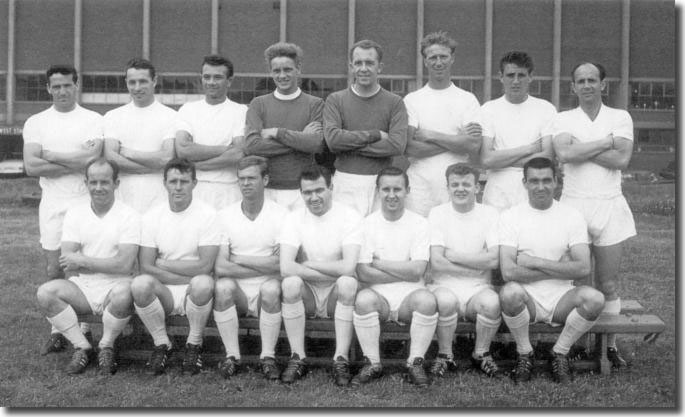 Part
2 - On the march at last - Results and table
Part
2 - On the march at last - Results and table
When Don Revie was appointed Leeds
United team manager in March 1961, he suggested
it would take five years to turn the club around. By the
spring of 1963, though, the young manager had already developed a
side that was good enough to compete with the best that the Second Division
had to offer. A bold policy of giving youth its head had reaped exciting
rewards as the Whites briefly challenged for promotion before three consecutive
defeats in May saw them finish fifth.
Billy Bremner, Paul Reaney, Gary Sprake and Norman Hunter were all first
team regulars at 20-years-old or less, teenagers Rod
Johnson, Peter Lorimer, Barrie
Wright and Jimmy Greenhoff
had been blooded and Terry Cooper and Paul Madeley would soon get their
chances. Bobby Collins was the old
man of the side at 32, and by a long stretch Jim
Storrie, Jack Charlton, Don
Weston, Tommy Henderson, Willie Bell
and Albert Johanneson were the
right side of 30.
These willing and energetic young men had benefited from the stringent
training routines of Les Cocker, who drove them to the peak of fitness
during the mid-winter lay off when football had been rendered impossible
by the wintry conditions. After the thaw they swept aside all comers.
Billy Bremner lost his place during that end of season run and asked
to go on the transfer list. The Elland Road fans had given him the bird
for his faltering contribution during the spring, but Revie still considered
the young Scot his outstanding talent. He took steps to stymie the moves
of any prospective buyers.
Homesickness had often threatened to cut short Bremner's association
with Leeds - Tommy Henderson had originally come down to join Leeds with
his fellow countryman before returning north of the border due to a lack
of opportunities. They had both agreed that their future lay back home,
but Bremner's chance in the first team delayed his departure. Henderson
returned to Elland Road in November 1962 but even his presence failed
to settle Bremner.
The young right winger continually pestered Don Revie to use him at the
heart of things in midfield, but the manager steadfastly resisted his
pleas, arguing that he was not ready for such a role. However, the experienced
Eric Smith broke his leg against Chelsea in September 1962, sorely weakening
the Leeds midfield, and Revie reconsidered his stance. In the run-in to
the 1963/64 season, Bremner finally got his wish. Revie deployed him at
right-half in a friendly against Roma, arranged as part of the deal which
had seen John Charles return,
albeit briefly, to Italy.
The little Scot took to the role like a duck to water, and so impressed
Revie that he started the season proper with the Bremner-Charlton-Hunter
half-back line that was to become so celebrated in the years to come.
The manager felt that a Bremner-Collins axis would provide a sound base
for success.
Of course, it meant that there was a hole to fill on the right flank,
but a long-term solution to that thorny issue would emerge a few days
into the new season. In the meantime, Revie used Don Weston in the No
7 shirt. The other change saw half-back Willie Bell in at left-back, a
role he had filled for a while in 1961/62. Bell succeeded Grenville Hair,
who now moved to the periphery 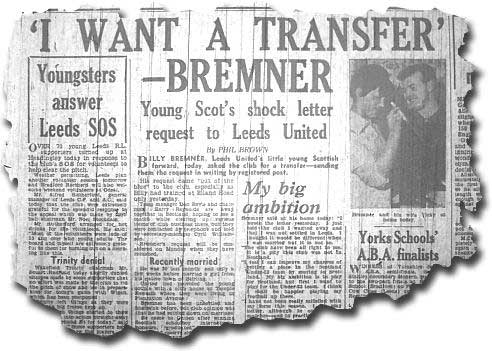 of
the first team before taking over as player-manager of Wellington Town
in May 1964 after almost 500 games for United.
of
the first team before taking over as player-manager of Wellington Town
in May 1964 after almost 500 games for United.
Leeds' season began four days after the rest of the country; their fixture
at Northampton Town had to be switched from the opening Saturday due to
a clash with a cricket match. Northampton CCC shared the County Ground
with the football club and had first refusal that weekend, so United were
left kicking their heels until the following Wednesday, when they commenced
operations with the visit of Yorkshire rivals Rotherham United to Elland
Road.
Middlesbrough, under the direction of former Leeds manager Raich
Carter, had already given notice of their designs on promotion by
registering a 5-0 win over Plymouth and a 3-0 thumping of Newcastle United
before the Peacocks had even taken the field, and promotion would be no
cakewalk. As Eric Stanger wrote in the Yorkshire Post, 'Leeds United's
supporters are a good deal more certain about promotion than the officials
at Elland Road. Mr Don Revie, the team manager, is realist enough to know
that despite the progress made last season, especially by his young players,
there are still obvious weaknesses in the side.'
back to top
Winning promotion from the second tier of the English League has always
been an enormous challenge, more so than with any other division, and
only the right approach will bring success.
Jason Tomas: 'Liverpool's manager Bill Shankly once said: "You can't
play your way out of the Second Division; you've got to claw your way
out." What Shankly meant was that the physical commitment to the
game at this level is so fierce that teams are given little chance to
express their skill. More often than not promotion is achieved by those
with the greatest determination and stamina, rather than constructive
ability.'
Those words could have been chosen with the Leeds United team of 1963
specifically in mind … rarely has a more determined and dogged set of
players been assembled.
Revie began the season with a forward line comprising Weston, Lawson,
Storrie and Johanneson, while Bremner and Collins formed a new midfield
combination in front of a rearguard which read Sprake, Reaney, Charlton,
Hunter and Bell.
Many of those names were to be stalwarts of the team for the next few
years and they certainly acquitted themselves admirably against Rotherham.
Bill Mallinson claimed in the Yorkshire Evening Post: 'With any
luck at all, and against a less competent goalkeeper than Ironside, the
Leeds men would have built up a three-goal lead by half-time. True, Rotherham
might have had a couple of goals in that period but they were distinctly
fortunate to turn round level. Bremner, at right-half, was the star turn.
He was occasionally in difficulty, it is true, when the ball was in the
air, but he and acting captain Collins showed amassed array when their
educated feet had their say. Bremner's brilliant constructive efforts
and his usual gritty work in defence fully justified Mr Don Revie's decision
to play him at right-half. There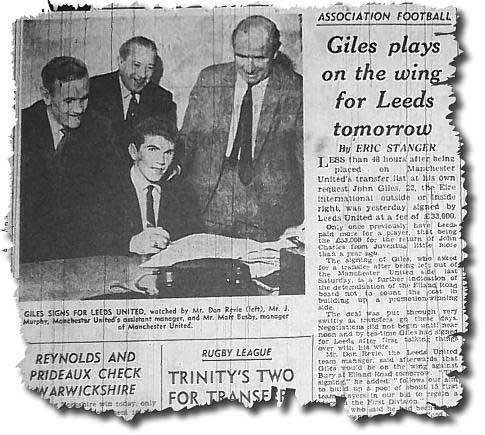 can be little criticism of United's middle line - the bulwark of any side
- on this form.'
can be little criticism of United's middle line - the bulwark of any side
- on this form.'
In the end, a single goal after 51 minutes by Don Weston was enough to
settle the contest. The lively Mansfield-born forward was in the right
place at the right time, profiting when Albert Johanneson's effort came
back off the post after the South African had done wonders to keep the
ball in play.
While Collins and Bremner took the plaudits, Mallinson revealed that
the younger man was still unsure of where his future lay: 'Despite his
display at right-half, which held the promise of a fine new career, Billy
Bremner still wants to leave Elland Road. Bremner told me today that the
transfer request he put in last February, and which was granted, still
holds good. 'I still want to be released - and I am not fussy about whether
I go back to Scotland,' he said. United put a £25,000 plus valuation on
Bremner, who said at the time that it was too high and would prevent him
moving from the club. Last night's display must have increased his value
as a utility player and certainly justified United's valuation in present
conditions.'
However, the very next day Don Revie gave Bremner some food for thought
by posting material notice of his ambition. He completed a surprise transfer
deal to secure the services of a man who was to radically enhance the
fortunes of Leeds United for the next decade.
John Giles, Manchester United's 23-year-old Irish international right-winger,
had been transfer-listed at his own request, along with Albert Quixall,
who had been signed from Sheffield Wednesday in a record £45,000 transfer
deal in 1958. The pair had featured in the Old Trafford club's FA Cup
final victory over Leicester City in May, but manager Matt Busby had left
them both out for the season's opener against Sheffield Wednesday.
Giles was born in Cabra, Dublin, on 6 November 1940, the son of a well-known
Irish footballer. He enjoyed local fame and celebrity with St Columbus,
Dublin City, The Leprechauns, Stella Maris and Home Farm, before following
the path of many of his countrymen by joining Manchester United in November
1957, just three months before the Busby Babes were wiped out at a stroke
on a frozen runway in Munich.
Giles was an outstanding young footballer, able to operate as either
winger or inside-forward, and he became the youngest player to win a full
cap for Eire just four days short of his 19th birthday, playing inside-right
against Sweden. It took him a mere 16 minutes to make an impact, slamming
home a 30-yard screamer in front of a 40,000 crowd at Dalymount Park as
Ireland pulled off a shock 3-2 win, just days after the Swedes had beaten
England at Wembley.
Giles had made his United debut a couple of months earlier in September
1959, and spent most of his Old Trafford days as a right winger. A rebellious
soul by nature, Giles was often at odds with Matt Busby, and his omission
from the team finally persuaded him that his face simply did not fit with
the Old Trafford hierarchy.
Don Revie was a great admirer of the Irishman and wasted no time in making
contact with Busby. A deal was done at a cost of £33,000, a fee second
only to that paid by Leeds for John Charles the previous year. It was
an extraordinary coup for Revie, who persuaded a classy and promising
performer to take an enormous gamble.
Giles said at the time: 'I do not mind going into Second Division football
and, who knows, I may be playing in the First Division again soon.' He
was excited at the potential of his new club, yet demoralised by his treatment
at Old Trafford, later saying, 'I played in 38 games and all the Cup matches.
But I'd been there as a young boy and maybe was not appreciated as much
as I should have been. And Leeds had had a good run the previous year.
When you are in the game, you notice these things. There was a feeling
about them. But Don was a big factor … he was a great football man. I
would have much preferred to join an up and coming Second Division team
than a poor First Division one. They had also signed Bobby Collins a year
or two back. That was a big factor too. From the time I joined, Leeds
were 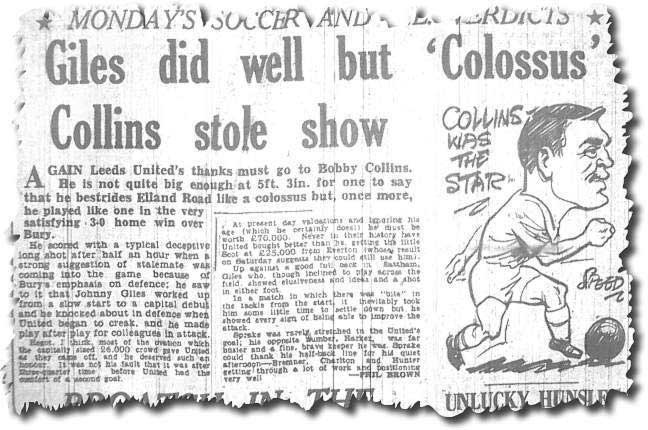 successful.
Don had learned from his playing days all the faults of managers. He knew
what he wanted to do … he was a very ambitious man, a very driven man.'
successful.
Don had learned from his playing days all the faults of managers. He knew
what he wanted to do … he was a very ambitious man, a very driven man.'
back to top
Giles was thrust straight into the Whites team a couple of days later,
replacing Ian Lawson for the home
game against Bury, with Don Weston switching to inside-right.
Leeds pulled off an impressive 3-0 win with goals from Collins, Storrie
and Johanneson, while Collins and Weston had further efforts ruled out
for offside. Giles had an unspectacular debut, and the honours once again
went to Bobby Collins. The Yorkshire Post's Eric Stanger gave tribute,
then offered a prophecy: 'But for Collins, Leeds might have been held.
Collins not only scored the first goal after half an hour, surprising
a retreating defence by going on and on up the middle and surprising it
even more by beating Harker with a dipping shot from 25 yards, but he
was here, there and everywhere, steadying, coaxing and prodding in turn.
"Stop Collins and you stop Leeds," they say in the Second Division.
But how? He gets in such out of the way places that he must be just about
the hardest forward in the game to mark. The man who may one day succeed
him as guide and mentor, Giles, had a steady, if not startling, debut
on the right wing. He did many good things, few bad ones, quickly attuned
himself to Collins' moves and will be all the better when he has got a
better hang of United's style.'
Collins suffered an injury in the next game, an exciting 2-2 draw at
Rotherham, with all four goals coming in the final ten minutes, and the
little Scot missed the trip to Manchester City. Jim Storrie fluffed a
penalty as Leeds lost 3-2, and it seemed promotion hopes were built on
shaky foundations.
However, with Collins restored to fitness, United went on a remarkable
run, putting together twenty straight League games without a reverse,
even though they had to manage for lengthy periods without Storrie and
Jack Charlton.
An ankle injury was the initial cause of Storrie's absence, but he later
needed a cartilage operation on his knee after being stretchered off at
Sunderland in December. It was a disappointing yet eventful season for
Storrie. In between injuries, he had to pull on the goalkeeper's jersey
at Plymouth when Gary Sprake went off injured for a while.
Just as serious was the loss of Jack Charlton, who was enjoying the form
of his life. He was now very much the senior defender and persuaded Don
Revie to try a new system.
Bagchi and Rogerson: 'This was the season when Jack Charlton matured
as a footballer. He had been attending courses at Lilleshall for a number
of years and now, with his new role as mentor to a juvenile defence, was
allowed by Revie to co-ordinate his own defensive system. The delegation
of duty seemed to inspire Big Jack. His method involved a great deal of
moaning and shouting, but his ability to explain his zonal design and
teach his team mates the positional awareness to cover for each other,
not to mention his own impeccable form, ensured Leeds' best defensive
record to date. With Collins and Bremner buzzing about in front as a protective
shield and Giles always ready to help out, Sprake's goal was breached
on only thirty four occasions in the whole season.'
It proved a remarkably effective system, but Charlton was laid low for
a while with a bout of tonsillitis and then suffered a rather more serious
knee injury.
The absence of two such key men offered fresh opportunities for club
captain Freddie Goodwin and the out of favour Ian Lawson. Both made decent
contributions in an impressive run, which saw Leeds assume leadership
of the division on 12 October, although the position was rotated for several
weeks with a powerful Sunderland outfit.
A win at Huddersfield brought United to the top of the table. Jason Tomas:
'It was a typical local derby, fast, furious,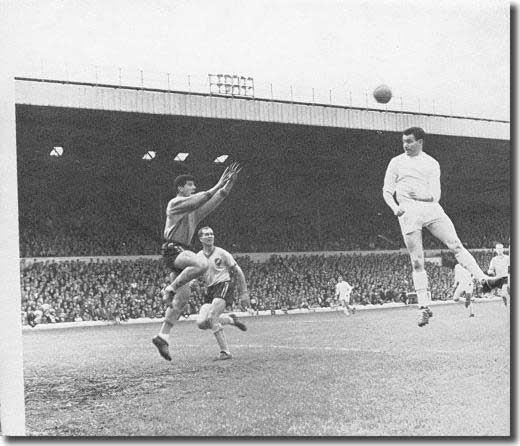 but enveloped by an atmosphere of tension which made it difficult for
either side to strike its normal rhythm. Defences were well on top during
the first hour - but twenty minutes from the end, Giles broke the deadlock
by scoring his first goal for the club.'
but enveloped by an atmosphere of tension which made it difficult for
either side to strike its normal rhythm. Defences were well on top during
the first hour - but twenty minutes from the end, Giles broke the deadlock
by scoring his first goal for the club.'
Johnny Giles: 'Before the kick off, the Boss told us: "Huddersfield's
goalkeeper Ray Wood is not very reliable in the air, so if anyone challenges
him for a high ball, make sure there's someone following up in case it
breaks loose." Well, Don Weston ran in to challenge Wood for a cross
from Albert Johanneson and I positioned myself four or five yards behind
him. Wood was unable to get the ball away cleanly, and it dropped just
in front of me!'
Nine minutes later Weston scored the second goal in a 2-0 win.
Giles had settled down in a three-man midfield with Bremner and Collins,
but the loss of Storrie blunted Leeds' cutting edge. It forced them to
adopt an aggressive, ugly approach, all functional containment rather
than flamboyant attack. They now had Don Weston playing at breakneck speed
on the right, alongside the limited Lawson, while fleet footed Albert
Johanneson was enjoying a remarkable season on the left wing. Control
and composure was little in evidence up front, despite the deftness of
much of Johanneson's work, and United settled into a hard working, pressing
game in midfield, supervised and co-ordinated by the remarkable Collins.
back to top
A mean-spirited and uncharitable approach was evolving, spiced up with
huge helpings of gamesmanship, and Revie's men were encouraged by how
successful it proved. Concentration, confidence and composure grew at
the back and, as often as not, a goal by Leeds would mean the opposition
might as well depart to the dressing room to remove their boots. On only
eight occasions in a wonderful season did opponents manage more than a
single goal in a game against United, and there were 17 clean sheets.
There were far too many draws (15) along the way for Leeds to distance
themselves from the pack, but the Whites proved to be the most durable
and difficult of teams. They also demonstrated how far they were prepared
to push the rules and the referees. Many of their players fell foul of
the man in black during the season, with Billy Bremner receiving a suspension,
a punishment rarely meted out in those days.
He had already received a written warning from the FA because of the
number of bookings he had been given. Revie suggested he was 'more sinned
against than sinning', adding, 'I have not asked him to change his style.
I think this lad is singled out for punishment, like one or two other
players in the Second Division. People forget that Albert Johanneson,
Bobby Collins and Johnny Giles come in for rough treatment. And none more
than Billy who, time and again, goes for a ball only to have his legs
kicked from under him. It is very difficult for any player to keep his
temper and not retaliate in these circumstances. I have had a quiet chat
with Billy and told him to go hard for the ball in the tackle, which he
does.'
Happily for Revie, Bremner withdrew his transfer request at the end of
September, seven months after tabling it. The manager had employed all
manner of tricks and ploys to keep other clubs at bay and had finally
managed to persuade the player that his future lay at Elland Road.
Andrew Mourant: 'Bremner did not realise it at the time but Hibernian
were desperately keen to secure his services. "Later, I got to know
they came in for me at £30,000 ... it was a colossal amount of money then.
Little did the Hibs manager know the gaffer had made up his mind I wasn't
going. Don would want £35,000, then £40,000. Then I gradually settled
down and started playing well, although I was on and off the transfer
list." Revie was quite desperate not to lose Bremner. He had already
fended off a bid from Everton, who were prepared to pay £25,000. The offer
had been a considerable temptation to the Leeds United directors, ever
mindful of the club's crippling debts.'
Bremner's suspension came after a succession of bookings, mainly for
over eagerness and dissent, rather than particularly dirty play, although
his team were certainly guilty on many occasions of taking things too
far. Many games degenerated into unsavoury battles with performance less
important than result.
The local papers were full of it in their match reports, acknowledging
United's part in provoking confrontation.
Phil Brown (Yorkshire Evening Post): 'There was bite in the tackle
from the start … The mutual zest of the tackling helped to spoil the game's
football and bring a stream of free kicks … Fouls, accidental and deliberate,
ruined the game, and left a very bad taste … Tackling and challenging,
which far too often went over the mark, strangled many attempts at constructive
play, and injured several on each side … This stormy game went on without
much football, but with all the physical challenge you could want.'
 Eric
Stanger (Yorkshire Post): 'The tenseness of the atmosphere kept
the excitement blazing but it had a detrimental effect on football skill
… in a game which needed strong handling because of the intensity of some
of the tackling … it was mainly a grim defensive battle that Leeds had
to wage … Leeds, in the end, coasted home, tapping the ball about to each
other in the Continental manner in the last few minutes to rub in their
superiority.'
Eric
Stanger (Yorkshire Post): 'The tenseness of the atmosphere kept
the excitement blazing but it had a detrimental effect on football skill
… in a game which needed strong handling because of the intensity of some
of the tackling … it was mainly a grim defensive battle that Leeds had
to wage … Leeds, in the end, coasted home, tapping the ball about to each
other in the Continental manner in the last few minutes to rub in their
superiority.'
Richard Ulyatt (Yorkshire Post): 'There were 40 fouls and a similar
number of toilet rolls thrown on to the field at Huddersfield on Saturday.
The fouls were almost evenly divided: it only seemed that Leeds United
were the greater offenders. Morally they were much more to blame. They
started the roughness. The first three fouls in the first half and five
of the first six in the second were committed by them. Huddersfield Town,
weaker in direction, in spirit and in the will to win were lured to their
own destruction by retaliating … the game had a needlessly bad tempered
spell in the second half … For some time now over-zealous methods have
been creeping into Leeds United's play to the detriment of both the quality
of their football and their reputation. I can understand the strain on
the players but unless some of them can learn more self-discipline Leeds
in the end will miss promotion and, even more important, the club will
lose many of the new friends they have made through their commendable
enterprise.'
Don Revie had drilled into his men the importance of promotion, and exposure
to the cynical tactics of Italian opponents in a series of 'friendly'
games had shown the efficacy of gamesmanship and time wasting. As promotion
became more than just a distant pipedream, and Leeds pulled away at the
head of the division with Sunderland, Preston North End and Charlton Athletic,
Revie's caution rose to the surface, becoming an all-consuming feature.
There is an often-told anecdote of the game at home to Derby County on
October 19. The United players chose to adopt a more expansive approach
than was their custom and found themselves badly outplayed by prosaic
opponents, trailing by two goals inside 25 minutes. Revie tore a strip
off his men at the interval, demanding to know what the hell they were
playing at. He ordered them to revert to type.
back to top
Chairman Harry Reynolds was more positive, according to the website Twelve
At The Top: 'Mr. Reynolds would often speak to the Elland Road supporters
over the loudspeaker system at half-time, and on one such occasion United
were two goals down to Derby County and not playing well when the chairman
took the microphone to tell everyone that Leeds United were going to win
promotion, and having done that would attempt to win the First Division
championship, not to mention the FA Cup as well. He said that the club
was very ambitious and its intention was to be in the major European competitions
where he also expected them to win trophies, and - as if that wasn't enough
- the money that would be made from all this great success would be put
back into the club, in order to build Elland Road into a super stadium!'
It seemed an unlikely forecast, but certainly United fought their way
back into the contest with a hard working second half display and goals
from Charlton and Weston forced a draw which seemed more like a point
gained than one lost after the poor start.
Jim Storrie recalls events this way:
'We reached the top of the table through literally running our opponents
off their feet, but became a bit cocky after a while and started trying
to play clever-clever stuff. It just didn't work.
'In one home match, against Derby County in October, we took a real panning
during the first half and were lucky to be only 2-0 down at the interval.
Don was hopping mad. He slammed the dressing room door behind him and
shouted: "What's all this namby pamby football? That's not the way
we taught you to play; I want it the Leeds United way."
'Well, we reverted back to our normal style of play in the second half,
turned on the physical pressure, and Derby crumbled. We eventually forced
a 2-2 draw, and it really brought us to our senses.'
Never again that season would United disobey Don Revie's diktat so flagrantly.
He had passionately reminded them of the value of a pragmatic approach
where points were what mattered, not the manner of their capture.
Leeds' economic style relied on making the most of the few goals that
came their way and then simply smothering the life out of the game. Their
defence was by no means infallible, however: Gary Sprake showed flashes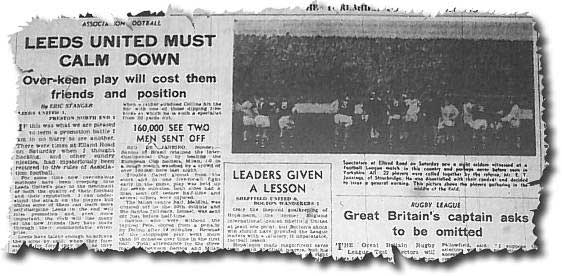 of inconsistency and propensity for error at key moments, mainly through
lack of concentration. In addition, the Whites struggled to finish off
teams at home, although their astonishing form away from Elland Road kept
them at the top of the table. A swift counter attacking game made the
most of United's assets.
of inconsistency and propensity for error at key moments, mainly through
lack of concentration. In addition, the Whites struggled to finish off
teams at home, although their astonishing form away from Elland Road kept
them at the top of the table. A swift counter attacking game made the
most of United's assets.
The goals coming from midfield were down on the year before: Collins,
Giles and Bremner contributed fewer goals (15 between them), whereas the
two Scots alone had managed 18 previously. Most of the attacking play
involved use of the long ball or individual breaks at speed by Weston,
Lawson or Johanneson, rather than any concerted passing movements.
The Yorkshiremen remained unbeaten at home but Swindon Town, Derby County,
Charlton, Preston and Northampton Town all left Elland Road with a point
in the first half of the season. However, wins at Northampton, Scunthorpe,
Huddersfield, Southampton, Grimsby, Leyton Orient, Plymouth and Bury in
the same period more than compensated. When Christmas brought a decisive
double header with Sunderland, Leeds were three points clear of their
Roker rivals at the top of table, having played a game less. It seemed
as if Don Revie might earn his first managerial success, although it was
Sunderland who were enjoying considerably more favourable newspaper coverage,
to the intense resentment of the manager. He had joined the Whites from
the Roker Park club at the end of his playing days and bitterly objected
to what he saw as the favouritism of the press.
However, his men were branded the dirtiest team in the country for good
cause. Leeds were involved in too many ill-tempered scraps for Revie's
protestations of innocence to gain any credence. The home draw with Preston
on 16 November saw referee Eric Jennings halt the game on the hour mark,
call the players together and sternly lecture them as to their behaviour.
There had been an endless stream of niggling, disruptive fouls and events
threatened to get badly out of hand. Things improved after the intervention,
but only marginally, and Don Revie commented afterwards: 'While we are
at the top, and playing teams with a promotion chance, we have to play
extra hard - for the opposition do. And then mistakes of judgement happen
on both sides. The essence of it was, that they are better players than
they are allowing themselves to be - that they are stopping their good
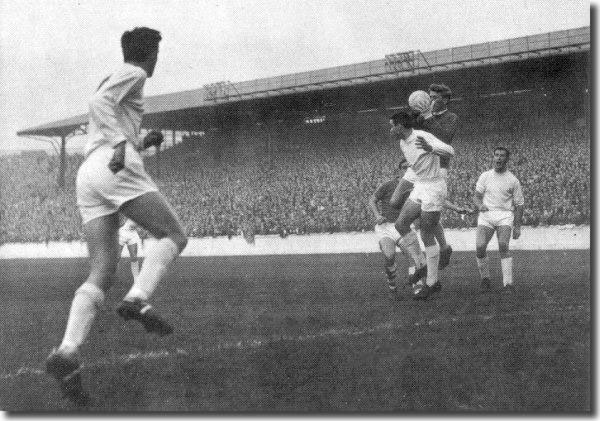 football
coming out.'
football
coming out.'
But that controversy was as nothing next to that generated by the two
battles with Sunderland.
The Wearsiders were fighting tooth and nail with United for leadership
of the division and it had been nip and tuck for weeks. Consequently immense
attention was given to the two games between the sides over the Christmas
period, intensifying the pressure on players who were prone to bad temper
and pushing things as far as they legitimately (or often illegitimately)
could.
back to top
Leeds' game was based on a confrontational, combative style, with hard
and early challenges on opponents to deny them time and space. Scottish
centre-forward Jim Storrie was out with an ankle injury, and his replacement,
Ian Lawson, could not match Storrie's guile or control. He was a robust
target man, but something of a journeyman with limited ability to hold
the ball up and bring oncoming midfielders into goalmouth action. Jack
Charlton was also missing at the back, though Freddie Goodwin was proving
a capable enough deputy.
The rest of the United team for the home game with the Black Cats on
Boxing Day were automatic choices: 18-year-old Sprake, fresh from Welsh
honours, was in goal; the experience of Goodwin and Bell, now settled
down at left-back, made for a good defensive combination with the youthful
Reaney and Hunter; Giles, Bremner and Collins were blending into one of
the most gifted midfield forces in the country; and Lawson and Weston
gave opposing defences plenty of hard afternoons, while the South African
left-winger Johanneson was having a wonderful season, and was at that
point joint top scorer with Weston on nine goals.
Sunderland, though, also had their stars, despite the loss of England
striker Brian Clough to the terrible injury that eventually brought his
playing career to a premature conclusion. Jimmy Montgomery was a gifted
young goalkeeper, Charlie Hurley was one of the most admired centre-halves
in the game and George Herd was a useful inside-forward. Johnny Crossan
and George Mulhall presented constant threats from the left flank and
the Wearsiders' all round team play made them dangerous opponents.
They enjoyed more favourable publicity than United and were generally
acknowledged as the better and more exciting of the two sides. Paradoxically,
however, they had managed only one goal more than Leeds before an Elland
Road showdown on Boxing Day. There was little doubt which defence was
the more effective - Leeds had conceded just 16 goals in 23 games to Sunderland's
27 in 24.
United also went into the match in the better form. While they were enjoying
their eighth successive away win at Bury on Saturday December 21, Sunderland
crashed 5-1 to their heaviest defeat of the season at Northampton. That,
coupled with Preston North End's defeat at Swansea on the Friday evening,
left the Whites with a lead of three points over Sunderland and four over
Preston. Sunderland had played a game more than the other two.
The match was all-ticket and, mindful of the money-spinning potential
of the clash, the powers that be laid plans for straw to be spread on
the pitch over the weekend to protect it from any chance of a postponement
for frost. The fixture did indeed go ahead, but despite all the precautions
the conditions were still difficult in the extreme as Eric Stanger reported
in the Yorkshire Post: 'But for the 40-ton blanket of straw spread
over the ground since last Saturday the match, which crackled with more
excitement than really clever football, would not have been played. Conditions
were treacherous. Pools dotted both penalty areas and part of the midfield;
peat blackened the goal areas and underneath the slimy top the ground
was hard from the frost. Coherent, planned football in its strict sense
was out of the question; so much had to be improvised according to the
whim of the impishly bouncing ball and a surface which gave no player
a second chance once he had committed himself in a tackle.'
Stanger went on: 'Leeds must have had 80 per cent or more of the play,
yet Hurley and Co cut down actual shooting chances to a minimum. Bremner
(of whom more later) had three cracks in the first half hour; Irwin and
Ashurst each stopped the ball on the line with Montgomery beaten, but
generally neither goalkeeper could put in a claim for overtime.
'It was 20 minutes before Sunderland got their first corner, 33 minutes
before Sprake had a direct ball to handle. Sunderland did more later,
of course, but generally their inside-forwards, Herd and Crossan, were
under the thumbs of Bremner and Hunter.
'Now about Bremner. I have been as critical as other writers about his
showing too much 'bite' and his too easily lost temper which has led him
into trouble with referees. His self-control in this game, despite the
utmost provocation, was magnificent. He took far more than his fair share
of 'stick', as they say, even allowing for the importance of the game.
'Sunderland never played as if they had real conviction that they could
win. Even when they scored after 55 minutes it seemed to take them seconds
before they and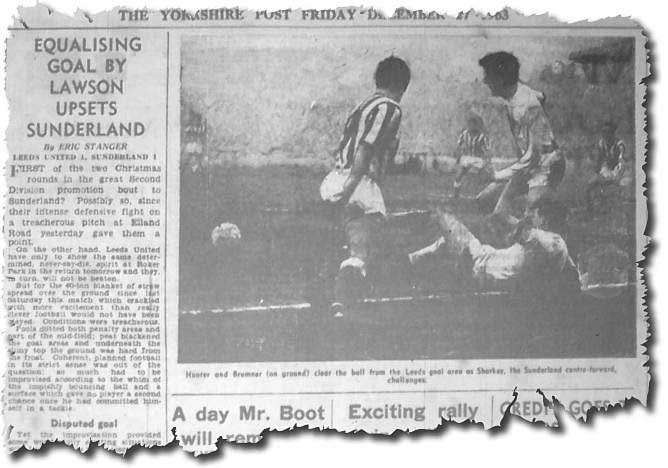 their big following realised that they were in fact ahead. It was a surprise
score in that it came directly against the way the game had been going
to that point but the chance was well enough made by Usher, the outside-right,
who bore through three tackles to square a ball across the penalty area.
Mulhall had drifted inside and his shot with his right foot crept inside
the far post with Sprake glued to his line. Sprake, I thought, expected
the ball to pass outside; afterwards he said he was unsighted.
their big following realised that they were in fact ahead. It was a surprise
score in that it came directly against the way the game had been going
to that point but the chance was well enough made by Usher, the outside-right,
who bore through three tackles to square a ball across the penalty area.
Mulhall had drifted inside and his shot with his right foot crept inside
the far post with Sprake glued to his line. Sprake, I thought, expected
the ball to pass outside; afterwards he said he was unsighted.
'United, prompted by Collins, Bremner and Hunter, hammered away afterwards
in desperate frontal assault. They might, it is true, have tried more
to find a side door by utilising Johanneson's speed more but it made for
magnificent, full-blooded cut and thrust.
back to top
'Sunderland looked as if they would hold out and United would fall for
the first time at home this season and end their unbeaten run, which now
stretches to 20 Second Division games, when Weston chased his own through
pass. Montgomery got there first but appeared to me to fumble the ball
as Weston stuck out a foot and put it into the path of Lawson, who had
throughout worked like a beaver chasing the half chance. This time he
had merely to tap the ball home. Sunderland protested vehemently. If there
was anything wrong with the score it was not in my line of sight, nor
the referee's, nor in the linesman's, being almost square to the incident.
'On the game as a whole Sunderland could not grumble. They played primarily,
or gave that impression, for a draw. In that, thanks to almost flawless
covering in defence, they succeeded. Leeds rescued a point as their great,
unflagging efforts fully entitled them to do.'
It was a disappointing outcome, yet left both sides looking forward eagerly
to the rematch at Roker Park two days later. The draw at Elland Road extended
United's unbeaten run to a club record 20 games, while eight away wins
on the bounce made them confident of gaining at least a point.
Don Revie chose to spring a surprise by dropping Albert Johanneson to
make way for Jim Storrie. The manager was concerned that the physical
approach the Sunderland defenders had used on the South African would
be even sterner on their own pitch. At times the left-winger could be
intimidated into anonymity by wily and aggressive opponents and Revie
chose to go for a more conservative approach. He recalled Storrie, switched
Johnny Giles to the left wing and moved Don Weston to the right.
All the manager's best laid plans, however, were torn apart inside the
first two minutes.
Only sixty seconds into the game, Hunter committed the first foul of
an ugly and rancorous match on Herd. Hurley took the free kick from just
inside the United half and lofted the ball into the middle of the penalty
area. Sprake came rushing out to catch the ball but dropped it, allowing
Herd to slam it home through a ruck of players.
After 25 minutes, another foul by Leeds led to a messy second goal for
Sunderland, almost a carbon copy of the opener. This time Ashurst lobbed
a 35-yard free kick from the touchline into the goal area. Sharkey, the
tallest Sunderland forward, had time and space to get in a back header
from which the ball rolled gently into the net off the far post.
The goals, if truth be known, were mere distractions, for the game consisted
mainly of a violent running battle and harsh verbal sparring between the
two sets of players, with the early foul by Hunter setting an unpleasant
precedent.
Eric Stanger's match report in the Yorkshire Post contained detail
of the mayhem which ensued: 'I hope there are no more games like that
at Roker Park on Saturday. It was so full of spite and malice that it
did no credit to the 22 players, the referee or the huge crowd of 56,046.
Where the tackling at Elland Road on Boxing Day was vigorous in the extreme
here it overstepped the bounds. Thirty-nine free kicks for fouls were
given by Mr J A Cattlin of Rochdale - 11 against Sunderland in the first
half, 10 against Leeds; five against Sunderland in the second half, 13
against Leeds. I am loath to criticise referees whose job is difficult
enough at the best of times but so many today fail to realise that control
does not begin and end with the use of a whistle and notebook. A Howcroft,
a Pinckston or an Ellis would not have tolerated this nonsense. Two Sunderland
players threw punches and got off scot-free: so did a Leeds player who
deliberately kicked at an opponent. As for the crowd it sickened me to
hear them cheer when a stretcher was called for Storrie, the Leeds inside-right
- cheers which increased in volume as he was carried off 20 minutes from
the end with damaged knee ligaments.'
Storrie needed an operation on his knee after the match and only featured
twice more all season.
It was a bruising encounter, with United's temper not helped by the referee
disallowing a 'goal' by Giles six minutes from time for offside against
another player. They had been second best on the day, distracted by the
verbal abuse of the Wearsiders, and allowed themselves to be drawn into
an ugly bloodbath.
Giles: 'We were no angels, far from it. But I honestly believe we were
more sinned against than sinning. We were young and inexperienced, and
Sunderland knew full well that we could be vulnerable to physical and
verbal provocation. They intimidated the Leeds players with such jibes
as: "You're a bunch of scrubbers,"' "That was a rubbish
tackle," and we eventually lost our heads. I am not condemning Sunderland
because I have done this sort of thing myself. Let's face it, most professional
footballers have. Unfortunately it took Leeds a long time to learn not
to let such tactics put them off their game.'
Their recent history meant that they received most of the blame for the
debacle, but Don Revie felt the criticism was one-sided: 'It has become
a positive gimmick with some newspapers and some people to call our side
dirty. Our lads can't tackle or challenge at all now without somebody
calling them foul. It is positive rubbish to call us a dirty team. We
have not had one player sent off, and only one, Bremner, given an FA caution
this season. Poor Bremner. He has toned his game up, and yet he was repeatedly
scythed down in the two Sunderland games. I have seen plenty 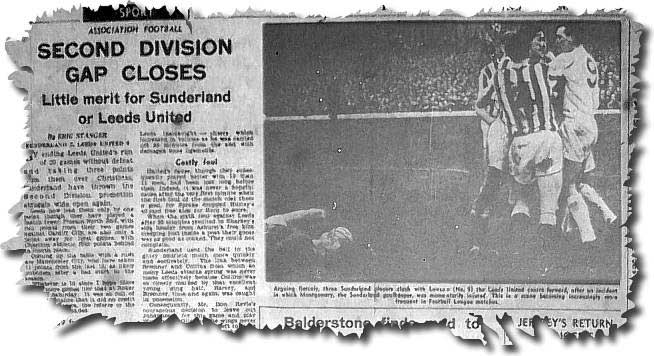 of
far worse games than Saturday's, let alone Boxing Day. I have played in
quite a few worse. But even if this was a big occasion game I can't see
any reason for giving us all the blame. There were two occasions when
Sunderland men went for our players with fists - yet the referee did nothing
about it. If our men had gone at Sunderland's like that I wonder what
would have happened.
of
far worse games than Saturday's, let alone Boxing Day. I have played in
quite a few worse. But even if this was a big occasion game I can't see
any reason for giving us all the blame. There were two occasions when
Sunderland men went for our players with fists - yet the referee did nothing
about it. If our men had gone at Sunderland's like that I wonder what
would have happened.
'I see no reason at all to lecture my players. I was proud of the way
they stood all they did on Saturday, especially after Jim Storrie was
lamed. My lads are under orders to play hard, to tackle hard for the ball,
and to fight for everything. How on earth else does anyone expect me to
instruct them in this season's hot Second Division?
'We have been given rugged opposition in nearly every game we have played,
home or away, since we got to the top. Just because we have overcome it,
it doesn't mean we are a dirty side but we are having to stand a lot of
cheap sneering just the same. And I am afraid that referees are being
affected by this sneering. We have had many a fair if hard tackle punished
recently.
'Anyway we shall just carry on doing our best, as the boys have been
doing. This gimmick - that is all it is - of calling us dirty will not
affect us. We can only soldier on under these blows, and that we will
do to the utmost.'
back to top
All the classic stirrings of a siege mentality could not hide the grim
facts: United's three point lead over Sunderland had been whittled down
to just one, although they still had a game in hand over their rivals.
Preston, 4-0 winners over Cardiff, were level on points with Sunderland,
with Charlton three points further away. The promotion battle was already
down to just these four clubs, for a gap to the rest had opened up, and
was never to completely disappear. It seemed that Leeds United were on
a slippery slope as far as their form was concerned, and an inability
to beat their closest rivals looked like scuppering Don Revie's cherished
dreams of promotion in the New Year.
Part 2 - On the march at last - Results
and table












 Part
2 - On the march at last - Results and table
Part
2 - On the march at last - Results and table
 of
the first team before taking over as player-manager of Wellington Town
in May 1964 after almost 500 games for United.
of
the first team before taking over as player-manager of Wellington Town
in May 1964 after almost 500 games for United. can be little criticism of United's middle line - the bulwark of any side
- on this form.'
can be little criticism of United's middle line - the bulwark of any side
- on this form.' successful.
Don had learned from his playing days all the faults of managers. He knew
what he wanted to do … he was a very ambitious man, a very driven man.'
successful.
Don had learned from his playing days all the faults of managers. He knew
what he wanted to do … he was a very ambitious man, a very driven man.' but enveloped by an atmosphere of tension which made it difficult for
either side to strike its normal rhythm. Defences were well on top during
the first hour - but twenty minutes from the end, Giles broke the deadlock
by scoring his first goal for the club.'
but enveloped by an atmosphere of tension which made it difficult for
either side to strike its normal rhythm. Defences were well on top during
the first hour - but twenty minutes from the end, Giles broke the deadlock
by scoring his first goal for the club.' Eric
Stanger (Yorkshire Post): 'The tenseness of the atmosphere kept
the excitement blazing but it had a detrimental effect on football skill
… in a game which needed strong handling because of the intensity of some
of the tackling … it was mainly a grim defensive battle that Leeds had
to wage … Leeds, in the end, coasted home, tapping the ball about to each
other in the Continental manner in the last few minutes to rub in their
superiority.'
Eric
Stanger (Yorkshire Post): 'The tenseness of the atmosphere kept
the excitement blazing but it had a detrimental effect on football skill
… in a game which needed strong handling because of the intensity of some
of the tackling … it was mainly a grim defensive battle that Leeds had
to wage … Leeds, in the end, coasted home, tapping the ball about to each
other in the Continental manner in the last few minutes to rub in their
superiority.' of inconsistency and propensity for error at key moments, mainly through
lack of concentration. In addition, the Whites struggled to finish off
teams at home, although their astonishing form away from Elland Road kept
them at the top of the table. A swift counter attacking game made the
most of United's assets.
of inconsistency and propensity for error at key moments, mainly through
lack of concentration. In addition, the Whites struggled to finish off
teams at home, although their astonishing form away from Elland Road kept
them at the top of the table. A swift counter attacking game made the
most of United's assets. football
coming out.'
football
coming out.' their big following realised that they were in fact ahead. It was a surprise
score in that it came directly against the way the game had been going
to that point but the chance was well enough made by Usher, the outside-right,
who bore through three tackles to square a ball across the penalty area.
Mulhall had drifted inside and his shot with his right foot crept inside
the far post with Sprake glued to his line. Sprake, I thought, expected
the ball to pass outside; afterwards he said he was unsighted.
their big following realised that they were in fact ahead. It was a surprise
score in that it came directly against the way the game had been going
to that point but the chance was well enough made by Usher, the outside-right,
who bore through three tackles to square a ball across the penalty area.
Mulhall had drifted inside and his shot with his right foot crept inside
the far post with Sprake glued to his line. Sprake, I thought, expected
the ball to pass outside; afterwards he said he was unsighted. of
far worse games than Saturday's, let alone Boxing Day. I have played in
quite a few worse. But even if this was a big occasion game I can't see
any reason for giving us all the blame. There were two occasions when
Sunderland men went for our players with fists - yet the referee did nothing
about it. If our men had gone at Sunderland's like that I wonder what
would have happened.
of
far worse games than Saturday's, let alone Boxing Day. I have played in
quite a few worse. But even if this was a big occasion game I can't see
any reason for giving us all the blame. There were two occasions when
Sunderland men went for our players with fists - yet the referee did nothing
about it. If our men had gone at Sunderland's like that I wonder what
would have happened.